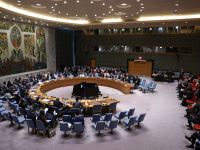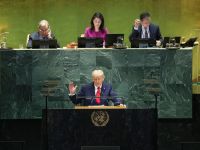Oil producers and consumers on an IMF panel struck an agreement here Sunday on the need to boost production and promote market stability, IMF officials said.News of the accord came amid mounting global pressure from oil consumers on the Organization of Petroleum Exporting Countries -- which holds a summit this week in Caracas -- to open the taps to ease surging prices.
"We found that there was common ground," British Chancellor of the Exchequer Gordon Brown told a news conference after a day-long meeting of the IMF policymaking committee.The International Monetary and Financial Committee, which includes the world's biggest oil producer, Saudi Arabia, agreed on the need for "reasonable" long-term oil prices and stability in the market, where prices have surged to 10-year highs at over 30 dollars a barrel.
Brown said he and and IMF Managing Director Horst Koehler had met representatives of some of the oil-producing countries during the day and that there had been a "lengthy" discussion among all 24 members of the committee.Brown, the committee chairman, said delegates from oil producers and consumers on the panel had agreed on "the need for stability, reasonable oil prices and the need also for increased production and for further steps to achieve that."
The agreement on the need for more oil declared by Brown went further than the committee's published statement, which "calls on them (oil producing countries) to take further steps to create conditions in oil markets conducive to healthy global growth."
The committee statement warned that currently high oil prices "could hamper growth, add to inflationary pressures and adversely affect prospects for many countries," particularly the poorest and those most dependent on oil imports.
A clearly satisfied Brown said: "I believe that this committee and the IMF representing all these different countries shows that you can achieve that common ground. "There is now an agreement about what ought to be done."
He added that committee members "look forward to the conclusions that will come from" the OPEC oil summit in Caracas Wednesday and Thursday.Koehler echoed his optimism."There is an awareness (among) the oil-producing countries that it's also not in their interest that this excessive oil price is there for too long, and that there is a common responsibility for the global economy to come back to more sustainable prices," he said.
"I am quite optimistic that we will see some improvements in the not too-far distance."Koehler stressed there was a "clear understanding" among participants in Sunday's discussions that the situation "needs to be a two-way street of structural change and this includes, of course, policies. They should continue to accelerate the preservation of energy in industrial countries."
The committee, made up mostly of ministers of finance or central bank governors, agreed that the IMF might have to show greater flexibility in its lending policies to meet "the needs of members that arise from a sustained period of high oil prices."
The statement took note of US President Bill Clinton's decision Friday to release 30 million barrels of oil from the 570-million-barrel US Strategic Petroleum Reserve in order to get more oil onto the market.
The committee added that "some other industrial countries may be in a position to examine the possibility of doing so to help achieve greater stability."
But Hamad Al-Sayari, the governor of the Saudi Arabian Monetary Agency, pointedly blamed high oil taxes in consuming countries for helping cause the oil crunch."For more stable market conditions, a responsible policy is also essential on the part of major consuming countries, especially those with excessive and biased taxes on petroleum products," he told the committee, according to a prepared text.
Ten oil producers were represented at the committee meeting, including three OPEC members, Saudi Arabia, United Arab Emirates and Algeria.—AFP.
©--Agence France Presse.
© 2000 Mena Report (www.menareport.com)







